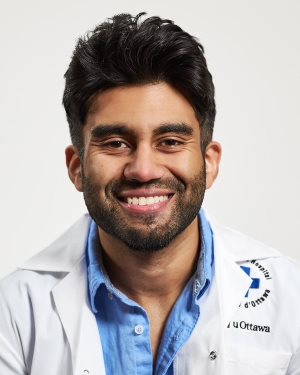 “Clinical decisions should be based on the totality of the best evidence, not on results from a single study,” said Faizan Khan. “We owed it to patients to give them precise estimates of their long-term risks.”Faizan Khan’s research will influence how doctors around the world treat venous thrombosis, the third-deadliest cardiovascular disease. This is a remarkable achievement for a PhD candidate in the early stages of his career.
“Clinical decisions should be based on the totality of the best evidence, not on results from a single study,” said Faizan Khan. “We owed it to patients to give them precise estimates of their long-term risks.”Faizan Khan’s research will influence how doctors around the world treat venous thrombosis, the third-deadliest cardiovascular disease. This is a remarkable achievement for a PhD candidate in the early stages of his career.
During the final year of his undergraduate degree in 2014, Faizan volunteered with an Ottawa stroke researcher who was pulling blood clots out of the brain as part of a clinical trial. Seeing the early days of this revolutionary treatment sparked his interest in research that could change patients’ lives.
“I was blown away at how this new procedure was drastically saving lives and reducing disability in patients with stroke,” said Faizan. “It ignited my interest in practice-changing research and inspired me to start reading about stroke and other cardiovascular diseases.”
One of those diseases was venous thrombosis, where a blood clot forms in a leg vein. While it may lack the drama of heart attack or stroke, this common condition can be deadly if the clot travels to the lungs.
About half of all cases happen in otherwise healthy people for no clear reason. Guidelines suggest these people take blood thinners for life to prevent a second clot.
Unfortunately, blood thinners can be inconvenient and cause bleeding. Deciding whether patients should take blood thinners for life requires balancing the long-term risk of a second clot if treatment is stopped with the risk of bleeding if treatment is continued. Without knowing the exact risk of a second blood clot, it was challenging for doctors and patients to make treatment decisions.
Faizan set out to answer this question in 2015, when he started his master’s degree in epidemiology under the supervision of world-renowned physician and thrombosis researcher Dr. Marc Rodger.
“Clinical decisions should be based on the totality of the best evidence, not on results from a single study,” said Faizan. “We owed it to patients to give them precise estimates of their long-term risks.”
The researchers formed an international collaboration to combine data from 18 relevant studies involving 7,515 patients with unexplained blood clots. They found that the risk of a second clot after stopping blood thinners was substantial, reaching 10 percent in the first year and 36 percent at 10 years. Four percent of those recurrent blood clots caused death. The findings were published in the prestigious journal, The BMJ.
Colleagues around the world are calling the study “a milestone in the field of thrombosis that will impact clinical practice and open up new scenarios for future research.”
“As a trainee who doesn’t work directly with patients, it can be hard to fully envision the impact of my research findings,” said Faizan. “But hearing the response from physicians and researchers around the world was like being told ‘keep doing what you’re doing.’ That is what inspires me to do research - answering important clinical questions that help improve patient care.”
Since 2015, Faizan has published a chapter in a leading cardiology textbook and 12 first-author manuscripts on topics related to venous thrombosis, stroke, and cardiac arrest, in top medical journals. He has also presented and received special recognitions at national and international conferences.
For his PhD in epidemiology, Faizan is answering the opposite question: what are the long-term risks and consequences of bleeding in patients with unexplained blood clots who continue taking blood thinners?
“Faizan is among the top graduate students that I have encountered in my career,” said his supervisor Dr. Rodger. “He has demonstrated an extraordinary talent for clinical research, stellar productivity, and an early commitment to practice-changing research. I have no doubts that he will be highly successful in his future research endeavors.”
The Ottawa Hospital: Inspired by research. Driven by compassion
The Ottawa Hospital is one of Canada’s largest learning and research hospitals with over 1,100 beds, approximately 12,000 staff and an annual budget of over $1.2 billion. Our focus on research and learning helps us develop new and innovative ways to treat patients and improve care. As a multi-campus hospital, affiliated with the University of Ottawa, we deliver specialized care to the Eastern Ontario region, but our techniques and research discoveries are adopted around the world. We engage the community at all levels to support our vision for better patient care. See www.ohri.ca for more information about research at The Ottawa Hospital.
University of Ottawa: —A crossroads of cultures and ideas
The University of Ottawa is home to over 50,000 students, faculty and staff, who live, work and study in both French and English. Our campus is a crossroads of cultures and ideas, where bold minds come together to inspire game-changing ideas. We are one of Canada’s top 10 research universities—our professors and researchers explore new approaches to today’s challenges. One of a handful of Canadian universities ranked among the top 200 in the world, we attract exceptional thinkers and welcome diverse perspectives from across the globe. www.uottawa.ca
Media Contact
Amelia Buchanan
Senior Communication Specialist
Ottawa Hospital Research Institute
Office: 613-798-5555 x 73687
Cell: 613-297-8315
ambuchanan@ohri.ca
